

Through our support, the International Rhino Foundation has been able to provide innovative legal training and assistance for rhino rangers and managers in private and state reserves in South Africa.
By visiting Brevard Zoo, YOU make an incredible impact on our natural world! Did you know that 25 cents of every daily admission and $5 of every membership goes toward our Quarters for Conservation program, which funds conservation projects throughout the world? In this “Updates from the Field” series, we’re sharing more on the projects YOU have funded!
Today, we’re learning more about one of our 2023 recipients, the International Rhino Foundation.
When and how did your organization begin?
More than 30 years ago, Zimbabwe’s black rhino population was decreasing at an alarming rate from intense, organized poaching. In response, a group of concerned individuals and institutions founded the Black Rhino Foundation in 1989 to assist in the conservation of black rhinos in Zimbabwe through efforts in the wild and in captivity. In part because of the Black Rhino Foundation’s support, poaching was virtually eliminated and Zimbabwe’ black rhino population began to stabilize. In most areas throughout the species’ range, numbers are now increasing. In 1991, recognizing that the escalating crisis facing all five rhino species was not receiving the attention it deserved, the Black Rhino Foundation expanded its mission and became the International Rhino Foundation (IRF).
Could you tell us more about your mission?
IRF’s mission is to ensure the survival of rhinos through strategic partnerships, targeted protection, and scientifically sound interventions. IRF is based in the United States and operates on-the-ground programs in Africa and Asia where rhinos live in the wild, supporting viable populations of the five remaining rhino species and the communities that coexist with them. Through grants and field programs, IRF has funded rhino conservation efforts in 10 countries, focusing on scientific research, anti-poaching, habitat conservation, captive breeding, environmental education, and demand reduction. Over the last decade more than $20 million has been invested in rhino conservation.
How do your projects support this mission?
IRF supports rhino conservation programs in Indonesia, India, Nepal and throughout Southern Africa. For all five rhino species, the highest priorities are also the most basic: bolstering anti-poaching activities or “boots on the ground”, maintaining intensive monitoring and active management of wild populations, and working with local communities. Our projects are founded on close collaboration and partnerships where we implement strategies that are based on local knowledge and available data.
We appreciate that many of your programs involve the community as well. Why is this so important?
IRF believes that local, on-the-ground organizations and communities are the best and most knowledgeable stewards of rhinos and their habitats. IRF works closely with like-minded conservation organizations, government agencies and local communities in each of the rhino range countries to operate rhino conservation programs. Local partners have the technical expertise, local knowledge and relationships to achieve lasting conservation results and to protect rhinos from extinction. IRF invests in programs that are strongly supported by local communities and local and national governments to ensure the sustainability and success of our efforts.
 For many people, rhino conservation draws the mind specifically to the species living in Africa. Could you tell us more about establishing programs in other parts of the world that have rhino species? How do you draw attention to these other species?
For many people, rhino conservation draws the mind specifically to the species living in Africa. Could you tell us more about establishing programs in other parts of the world that have rhino species? How do you draw attention to these other species?
While the African rhino species are perhaps the most well known, the most critically endangered rhino species in most need of support are found only in Indonesia. IRF has a long history working to protect both the Javan and Sumatran rhinos in Indonesia, alongside local NGOs and Indonesia’s Ministry of Environment and Forestry. Further, we support efforts to protect the greater one-horned rhino in India and Nepal. To draw attention to the three Asian rhino species, IRF works with zoos in the US and Europe to increase awareness of these unique mammals. We host virtual educational events on 5/5 and World Rhino Day to celebrate all five species of rhino and bring attention to the need to conserve them.
How will the funds from Brevard Zoo help your organization?
The funds from the Brevard Zoo will be used to build capacity in South Africa’s rhino rangers – the first line of defense against illegal poaching. The rhino population in Africa continues to decline – there are at least 1,400 fewer rhinos on the continent this year compared to pre-pandemic estimates. Unfortunately, South Africa is the epicenter of the rhino poaching crisis, with more than 8,900 black and white rhinos killed for their horns over the past thirteen years. Most illegal activity has occurred in the Kruger National Park, a 19,485 km2 protected habitat on South Africa’s north-eastern border with Mozambique.
The level of effort and the expense required to safeguard rhinos continues to intensify. IRF partners with our on the ground partner, Stop Rhino Poaching (SRP) in South Africa to protect rhinos in Kruger National Park. Funds from the Brevard Zoo will be used to provide innovative legal training and assistance for rhino rangers and managers in private and state reserves in South Africa. By providing this legal training and support to rangers and managers, we aim to contribute to “technicality free” cases and more prosecutions and convictions. Our ultimate goal is to increase rhino populations in critical habitats in South Africa by disincentivizing and decreasing rhino poaching.
Brevard Zoo is an independent, not-for-profit organization that receives no recurring government funding for our operating costs. Your generous support enables us to continue to serve our community and continue our vital animal wellness, education and conservation programs.